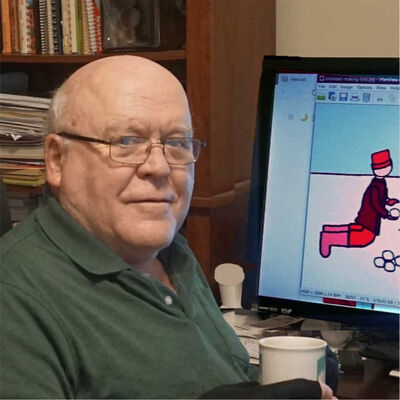Important Copyright Ruling to Photographers
May 20, 2023 15:52:28 #
May 20, 2023 15:53:21 #
CHG_CANON wrote:
You can read some of the links in the replies abov... (show quote)
I had always heard that you could sue for actual damages without registration (which can be hard to prove), but with registration you could get punative damages.
May 20, 2023 16:09:56 #
May 20, 2023 16:47:23 #
Maybe, just maybe, once and for all we can finally and successfully knock down at least one internet urban legend ...
Steve, John -
A postmarked envelope does not prove that a work is original or created by you. It 'might' show a point in time when the work existed, which 'might' be relevant to showing it existed elsewhere, prior to the date of creation of another's work and / or infringement.
According to section 412 of the U.S. Copyright Act of 1976 (17 U.S.C. 408), registration of a work with the Copyright Office is a prerequisite for copyright protection. A "Poor man's copyright" is therefore not a substitute for registration.
Eric Goldman, law professor, Santa Clara University School of Law, has noted the absence of US cases / judgments that give any value to the poor man's copyright. He also states, "To establish copyright infringement, the author must show copying-in-fact and wrongful copying. The postmark has no relevance to the wrongful copying question."
Moreover, section 411 of the same U.S. Copyright Act of 1976 clarifies that a certificate of registration (or refusal) from the U.S. Copyright Office is a prerequisite to bringing a copyright infringement action in federal court.
Summary: no registration, no ability to file suit.
Steve, John -
A postmarked envelope does not prove that a work is original or created by you. It 'might' show a point in time when the work existed, which 'might' be relevant to showing it existed elsewhere, prior to the date of creation of another's work and / or infringement.
According to section 412 of the U.S. Copyright Act of 1976 (17 U.S.C. 408), registration of a work with the Copyright Office is a prerequisite for copyright protection. A "Poor man's copyright" is therefore not a substitute for registration.
Eric Goldman, law professor, Santa Clara University School of Law, has noted the absence of US cases / judgments that give any value to the poor man's copyright. He also states, "To establish copyright infringement, the author must show copying-in-fact and wrongful copying. The postmark has no relevance to the wrongful copying question."
Moreover, section 411 of the same U.S. Copyright Act of 1976 clarifies that a certificate of registration (or refusal) from the U.S. Copyright Office is a prerequisite to bringing a copyright infringement action in federal court.
Summary: no registration, no ability to file suit.
May 20, 2023 18:24:55 #
lamiaceae wrote:
Justice is very slow. When was this case decided. Andy Warhol died in 1987! 

Ironic considering the earlier Andy Warhol-Campbell's Soup suite!



Ironic considering the earlier Andy Warhol-Campbell's Soup suite!


The photo of concern was published in 2016 with a license from the Andy Warhol Foundation. So, Warhol was not the offender, but his foundation was. --Richard
May 20, 2023 18:41:48 #
larryepage wrote:
Readers may want to do some further research into ... (show quote)
The issue is not black or white. As I understand it, Copyright Law allows for "transformations". That is, an image (photo or painting) can be copied and transformed (pixilated, altered, distorted etc) and Copyright may no longer apply. Apparently Warhol thought his transformation was sufficient to avoid a copyright infringement. The court didn't think so. Another time and another court may think differently.
May 20, 2023 18:45:49 #
Ednsb
Loc: Santa Barbara
Time will tell if this will apply in any other case. On the surface it is just a breach of contract and should have never gotten to SCOTUS. I am sure the lawyers made more than the plaintiff. However, if someone sues an AI artist that takes a copyrighted image and modifies for profit this case MIGHT have some use.
May 20, 2023 18:54:25 #
CHG_CANON wrote:
Maybe, just maybe, once and for all we can finally and successfully knock down……..
As usual Paul, you sound the bell of reason and sense.
Thank you for clarifying “The Poorman’s Copyright.” In truth that was a holdover from my days at James Madison High School, Brooklyn, NY.
May 20, 2023 18:56:51 #
May 20, 2023 19:20:59 #
I am not sure if hoggers have listened to Pachelbel’s Canon in D. Some people have heard the group Maroon 5 sing Memories. Actually Maroon 5 used music from The Canon and wrote lyrics to it. However it is not Copyright Infringement. Pachelbel’s work is now in the Public Domain. They are very clever to avoid a legal challenge.
May 20, 2023 19:22:12 #
carlberg wrote:
The issue is not black or white. As I understand it, Copyright Law allows for "transformations". That is, an image (photo or painting) can be copied and transformed (pixilated, altered, distorted etc) and Copyright may no longer apply. Apparently Warhol thought his transformation was sufficient to avoid a copyright infringement. The court didn't think so. Another time and another court may think differently.
According to the lawyers I've talked to, this is not true.
May 20, 2023 20:03:32 #
larryepage
Loc: North Texas area
AzPicLady wrote:
According to the lawyers I've talked to, this is not true.
Copyright law was significantly revised in 1976. There have been additional adjustments as technology advances have changed the landscape. It is important to be living in and understanding the present copyright universe to understand the rules. Relying on what one thinks he might have heard that someone read about many years ago is a dangerous approach.
May 20, 2023 20:30:13 #
"The use of a copyrighted work may nevertheless be fair if, among other things, the use has a purpose and character that is sufficiently distinct from the original. In this case, however, Goldsmith's original photograph of Prince, and AWF's copying use of that photograph in an image licensed to a special edition magazine devoted to Prince, share substantially the same purpose, and the use is of a commercial nature."[12]
From the case itself, the use of the photograph was not fair use as the photograph as published by AWF was similar, not "sufficiently distinct" from the original photograph. The fair use doctrine allows for commentary or criticism of original work without need for attribution to the creator or author. But here, the original photograph of Ms. Goldsmith dating back from 1981 was readily identifiable. The court also noted no formal licensing agreement or the like, just a $400 fee. That is the lesson, then again how could have Ms. Goldsmith anticipated subsequent use of her photograph years later and the resulting journey to the United States Supreme Court?
But one must ask, what exactly was the fight over from a dollar perspective? That is, what will be the damages? No indication dollarwise what is or was at stake. From the numerous amicus briefs filed, it was the point of law at stake, the extent of the fair use doctrine, not so much dollars. No great lesson for photographers in general other then securing a detailed licensing agreement with the buyer, assuming you are taking a photograph of a famous soon to be deceased celebrity.
From the case itself, the use of the photograph was not fair use as the photograph as published by AWF was similar, not "sufficiently distinct" from the original photograph. The fair use doctrine allows for commentary or criticism of original work without need for attribution to the creator or author. But here, the original photograph of Ms. Goldsmith dating back from 1981 was readily identifiable. The court also noted no formal licensing agreement or the like, just a $400 fee. That is the lesson, then again how could have Ms. Goldsmith anticipated subsequent use of her photograph years later and the resulting journey to the United States Supreme Court?
But one must ask, what exactly was the fight over from a dollar perspective? That is, what will be the damages? No indication dollarwise what is or was at stake. From the numerous amicus briefs filed, it was the point of law at stake, the extent of the fair use doctrine, not so much dollars. No great lesson for photographers in general other then securing a detailed licensing agreement with the buyer, assuming you are taking a photograph of a famous soon to be deceased celebrity.
May 20, 2023 20:52:49 #
russdog99 wrote:
"The use of a copyrighted work may neverthele... (show quote)
OK, but just *how soon* to be deceased should the soon to be deceased celebrity be ? One foot in the grave and the other foot on a banana peel ?
May 20, 2023 20:54:10 #
larryepage wrote:
Copyright law was significantly revised in 1976. There have been additional adjustments as technology advances have changed the landscape. It is important to be living in and understanding the present copyright universe to understand the rules. Relying on what one thinks he might have heard that someone read about many years ago is a dangerous approach.
I don't remember exactly the year, but I think the 90's. Maybe later.
If you want to reply, then register here. Registration is free and your account is created instantly, so you can post right away.







